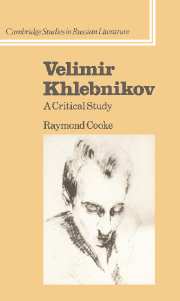3 - The tower of the word
Published online by Cambridge University Press: 12 September 2009
Summary
It is probably Khlebnikov's assault on the ‘tower of the word’ which is regarded by most as his major battle. Although he may have had a fear of ‘sterile, abstract discussions about art’ (NP 367), he certainly did not fear discussions about the word and about language. He left several articles dealing with this subject and providing an exposition of his views. These views were of crucial importance for the Russian Futurist movement.
Khlebnikov was in the vanguard of experimental work on language and, as Willem Weststeijn has pointed out, even ‘several years before the first Futurist manifesto was published … had already formulated some of the principles of the Futurists' language renovations’. Long before Russian Futurism with its programme of word creation had been thought of, Khlebnikov had coined scores, if not hundreds, of new words. If the Futurist ‘Slap’ manifesto had expressed a ‘hate’ for the existing literary language, then Khlebnikov was already attempting to reshape this language. Although Khlebnikov called for a siege of languages (SP v 259) and for their destruction (SP v 157), his approach was also constructive.
Like his Cubo-Futurist colleagues, Khlebnikov was keen to see the word assume its rightful place in the literary arts after what was regarded by them as some years of neglect.
- Type
- Chapter
- Information
- Velimir KhlebnikovA Critical Study, pp. 67 - 103Publisher: Cambridge University PressPrint publication year: 1987



